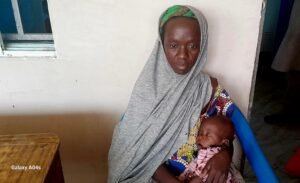In the heart of Zamfara State, Nigeria, a silent crisis is unfolding, hidden from the world’s gaze but devastating in its impact. Here, amidst the arid landscapes and dusty villages, the spectre of malnutrition looms large, threatening the lives of innocent children like 9-month-old Khadija whose future hangs in the balance due to lack of exclusive breastfeeding. Her story is not unique in Zamfara State, where mothers struggling to survive the economic realities cannot provide their children with the essential nutrition they need to thrive.
In this report, our Correspondent, Gom Mirian writes on the desperation to get food, cultural practices, and harsh reality many families in this region face.
Aisha’s Story
Khadija, a 9-month-old baby, continuously cried and desperately sought her mother’s attention, for both love and food. Sadly, she was deprived of essential human breast milk, which provides vital nutrients and other bioactive molecules to support her overall health. As a result of this deprivation, Aisha has already started showing signs of severe malnutrition.

“I don’t breastfeed my children because the breast doesn’t produce enough milk, you see not much milk comes out,” said her 39-year-old mother, Inno Abdullahi, a widow who struggles with hunger and the belief passed on to her by her grandparents that cow’s milk, known as ‘Nunu’ in Hausa language, will make her children stronger.
Chosen to forego exclusive breastfeeding for her six children including Khadija. Tragically, out of her six children, five have already fallen victim to malnutrition- their growth stunted and their health compromised.
Inno who sits with sunken eyes cradling her frail looking daughter laughed as if to conceal her worries. “My husband’s father does not believe in exclusive breastfeeding but ‘Nunu’ and coupled with the fact that I don’t have food myself, exclusively breastfeeding them will kill me.”
Khadija’s story is a familiar one in Zamfara, where malnutrition is a silent killer, claiming the lives of countless children each year. The root cause of this crisis lies in the absence of exclusive breastfeeding, a practice that is essential for the healthy development of infants in their first six months of life. Yet, in Zamfara, cultural beliefs and economic hardships often conspire to prevent mothers from following this vital recommendation.
The State of Exclusive Breastfeeding in Nigeria
In Nigeria, the practice of exclusive breastfeeding is distressingly low. According to a joint report by the United Nations Children’s Fund (UNICEF) and World Health Organization, only 29 per cent of Nigerian mothers exclusively breastfeed their babies in the first six months of life, well below the minimum 60 per cent recommended by the World Health Organization and UNICEF.
This means that over 70% of infants in Nigeria are denied the benefits of breast milk in their formative years.
Here in northern Nigeria, where conflict, cultural beliefs, influence of husbands and other family members, poverty, limited access to nutritious food leave mothers malnourished themselves, and the availability of safe alternatives have long contributed to the problem, making Khadija among the 70% Nigerian infants who are denied the benefits of breast milk in their formative years, according to the UN’s report.
The Reality for Many Mothers
Inno is not alone in her decision to neglect exclusive breastfeeding. Another mother, Sumaya Ibrahim, shares a similar story of hardship and desperation. “I cannot afford to feed myself, let alone produce enough milk for my baby,” she laments. The cycle of poverty and malnutrition perpetuates itself as mothers like Inno and Sumaya struggle to provide for their families amidst dire circumstances.
The Benefits of Exclusive Breastfeeding
Exclusive breastfeeding is not just a recommendation; it is a lifeline for infants like Aisha.
Decades of research have determined that exclusive breastfeeding is not only all a baby needs in the first six months of life but also very important for its present and future health and well-being. Rich in the nutrients and antibodies that infants need, it contains the right quantities of fat, sugar, water, and protein, strengthening their immune system, and protecting them against killer childhood illnesses.
A report by the National Nutrition and Health survey shows that an exclusively breastfed child is 14 times less likely to die in the first six months than a non-breastfeed child, and breastfeeding drastically reduces deaths from Acute Respiratory Infection (ARI) and diarrhoea the two major child killers.
“The baby should be exclusively breastfed for the first six months of life,” says Dr Davies Omotala, a renowned child nutrition specialist. “It is crucial for their survival and development.
Implications of Non-Exclusive Breastfeeding
The consequences of not exclusively breastfeeding are dire. Malnourished children face a host of health issues, including stunted growth, weakened immune systems, and cognitive impairments. The long-term effects of malnutrition can impact a child’s development and prospects, perpetuating a cycle of poverty and ill health.
The Economic Toll – Raising Malnourished Childre
The economic repercussions of raising malnourished children extend far beyond individual households. The Nigerian and Zamfara State governments face an enormous financial burden as a result of heightened healthcare costs, reduced productivity, and a perpetuation of a cycle of poverty.
The cost of treating malnutrition and its associated complications diverts resources that could be better utilized in preventative measures and community support programs.
High Malnutrition Rates
The United Nations Children’s Fund (UNICEF) says that every hour, 100 children under 5 years die of malnutrition in Nigeria, accounting for about 2,400 children’s deaths daily due to malnutrition. This suggests that high food prices and general food insecurity may already be consuming the lives of babies and toddlers by the hour.
Expert Insight and Efforts by Development Partners
Shedding light on Zamfara’s predicament, Africa Health Report, (AHR) reached out to a nutrition expert and a community health worker who is familiar with the situation in Zamfara State to provide invaluable insights.
Dr. Davies Omotala, a renowned child nutrition specialist, sheds light on the alarming practices seen in Zamfara State. “The cultural perceptions surrounding traditional alternatives like ‘Nunu’ must be addressed. We must emphasize the importance of exclusive breastfeeding from birth, as it provides the essential nutrients needed for infants to survive and thrive,” he states emphatically.
Also, in an interview with Africa Health Report, the 2nd in command at the CMAM centre at the Women and Children Welfare Clinic in Bungudu local government area of Zamfara State, Nasiru Lawal highlighted the alarming rise in malnutrition cases, revealing, “Unlike before, the number of malnourished children detected here has increased. Every day, we receive over two hundred cases of frequent stooling and diarrhoea, and upon examination, malnutrition is evident. We have even depleted our Ready-to-Use Therapeutic Food (RUTF) supplements supply due to the high demand.
Addressing the issue of mothers not adhering to exclusive breastfeeding, Lawal expressed, “They often voice concerns about hunger and insufficient food for themselves and their babies, hindering breastfeeding. However, we consistently educate them on the benefits of breastfeeding during our health talks.”
In a glimmer of hope, development partners like UNICEF are working tirelessly to provide support for malnourished children and their mothers. UNICEF has been instrumental in addressing malnutrition in the Northern states of Nigeria, including Zamfara, by integrating Community-based Management of Acute Malnutrition (CMAM) into primary health care programs in communities and providing Ready-to-Use Therapeutic Food (RUTF) supplements, used to treat severe wasting at the community level and emergencies at no cost to the affected children.
Finding Solutions
To curb malnutrition in Nigeria, several government and donor-supported programs have been introduced, including nutrition counselling, gardening programs, Community Management of Acute Malnutrition (CMAM), and more recently school feeding programs.
In Zamfara State alone, N400 million is spent monthly on the feeding of students in 192 secondary schools across the 14 local government areas as a tool for addressing the high number of out-of-school children and malnutrition in the state, according to the Executive Chairman of the program, Atiku Maradun, revealed this in an interview in Gusau. However, these interventions do not reach children like Khadija, who are denied breast milk by their mothers due to hunger and cultural beliefs.
Until deliberate efforts are made to target the root causes of non-exclusive breastfeeding by mothers like Inno and Sumaya, whose hunger deprived their children of breast milk that landed them in the CMAM centres, malnutrition will continue to plague the state in particular and Nigeria at large.
The story of Khadija is just one of many in Zamfara, where the hidden crisis of malnutrition continues to threaten the lives of innocent children.
As we reflect on Khadija’s journey from the brink of death to the promise of life, we are reminded of the urgent need for action to address the root causes of malnutrition in Zamfara. By prioritizing exclusive breastfeeding, and investing in healthcare infrastructure, and community support systems, we can empower mothers to provide their children with the nutrition they need to thrive, breaking the cycle of poverty and despair that has gripped this region for far too long
Let Khadija’s story be a call to arms, a rallying cry for all those who believe in the power of compassion and solidarity to create a brighter future for the children of Zamfara.
Together, we can overcome the hidden crisis of malnutrition, ensuring that every child has the chance to grow up healthy, happy, and full of promise.



